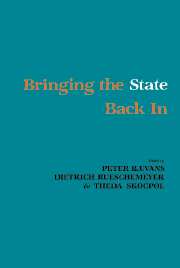Book contents
- Frontmatter
- Contents
- Preface
- Introduction
- Part I States as Promoters of Economic Development and Social Redistribution
- Part II States and Transnational Relations
- Part III States and the Patterning of Social Conflicts
- Conclusion
- 11 On the Road toward a More Adequate Understanding of the State
- Notes on the Contributors
- Index
11 - On the Road toward a More Adequate Understanding of the State
Published online by Cambridge University Press: 29 January 2010
- Frontmatter
- Contents
- Preface
- Introduction
- Part I States as Promoters of Economic Development and Social Redistribution
- Part II States and Transnational Relations
- Part III States and the Patterning of Social Conflicts
- Conclusion
- 11 On the Road toward a More Adequate Understanding of the State
- Notes on the Contributors
- Index
Summary
An intellectual sea change is underway in comparative social science, so the introductory essay to this volume argued. A diverse set of scholars with wide-ranging substantive concerns has begun to place the state, viewed as an institution and social actor, at the center of attention. Yet the introduction also suggested that the important work of theoretical reorientation is only beginning to be done. To overcome deeply rooted assumptions about the absolute causal primacy of socioeconomic processes and – in measured, appropriate fashion – to “bring the state back in” to our studies of social change and politics require continuing theoretical innovation and comparative-historical research, each closely coordinated with the other.
As the book now draws to a close, we are in a position to look both backward and forward. How have the essays assembled here improved our understanding of states in relation to social structures? Can we find common threads of methodological approach, conceptualization, and analytical strategy that point to fruitful directions for future scholarship? What gaps in our understanding of the state seem most salient? Are there new research topics that could and should be pursued in the future?
In the pages to come, we shall pull together themes and lessons from this volume and identify some promising frontiers of research, moving through a series of topics that encompass both concerns. We begin with reflections on the methodological style of this book and then assess what all of its essays considered together can tell us about state autonomy, state capacities, and the best ways to do further work on these issues.
- Type
- Chapter
- Information
- Bringing the State Back In , pp. 347 - 366Publisher: Cambridge University PressPrint publication year: 1985
- 43
- Cited by

